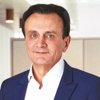Fritextsökning
Artiklar per år
Innehållstyper
-

Björn Arvidsson: ”Olyckligt att blanda ihop life science och sjukvård”
"Även om life science är morgondagens sjukvård, är det viktigt att inse att dessa två sektorer har olika behov och förutsättningar". Det skriver Björn Arvidsson i en krönika.
-

Anna Törner: Yes, I Am Sick, But Not Weak
”People often say that someone who is ill only has one wish—to get better. But I think that is not true. Someone who is ill also longs to be understood, to be respected, to not have their identity overshadowed by their condition”, writes Anna Törner in a column.
-

Thumbs down for lecanemab in the EU – “Very surprised”
The Azheimer's drug lecanemab has received a negative assessment from the European Medicines Agency’s Committee for Medicinal Products for Human Use (CHMP), according to an announcement made by the Agency last week. Bioarctic’s CEO Gunilla Osswald describes the reactions after the announcement as a surprise and disappointment.
-

Tidigare Tobii-chef blir vd för Surgical Science
Tom Englund, tidigare toppnamn inom Tobii-koncernen, är nuvarande operativ chef för Instabee. Nu lämnar han budbolaget och återvänder till medicinteknikfältet när han blir vd för Surgical Science i oktober.
-

IGN: Marknadsföring av prisvinnande läkemedel var vilseledande
Att framföra att ett läkemedel vunnit ett pris går att tolka som att det är bäst i sin klass, och kan därför vara vilseledande. Det slår Informationsgranskningsnämnden, IGN, fast i ett beslut.
-

Innovative start-up helps doctors, scientists and industry balance coagulation risks
For many doctors caring for seriously ill patients, for example, in stroke units and cancer wards, maintaining the life-saving balance between bleeding and thrombosis is an ongoing challenge. In the late 1980s, scientists at Maastricht University in the Netherlands developed an innovative method, the thrombin generation assay (TGA), which provides a complete overview of a physiological process crucial for maintaining normal haemostasis.
-

Samuel Lagercrantz: “Companies that do this successfully will take the lead”
The development of new medicines and medical technologies should not focus too narrowly on prolonging life. It is equally important to develop treatments that relieve pain or eliminate painful symptoms, writes Samuel Lagercrantz in an editorial.
-

Astra Zeneca's Covid-19 vaccine Vaxzevria is being withdrawn worldwide
AstraZeneca initiates a worldwide withdrawal of its Covid vaccine Vaxzevria. The measure is taken just months after the company admitted the vaccine can cause a rare and dangerous side effect, but AstraZeneca claims that the decision is purely commercial.
-

Nocebo – the evil twin that makes you feel worse
The placebo effect is well known in healthcare, but not so its opposite: nocebo. “The effect is small, but it can have major repercussions,” says Uppsala researcher Charlotte Blease, co-author of a book on the phenomenon.
-

Study: Popular diabetes treatment is not associated with thyroid cancer
Concerns raised about an association between GLP-1 analogues, used to treat diabetes and obesity, and an increased risk of thyroid cancer are not supported by an extensive Scandinavian study.
-

Anna Törner: ”Orphan Designation – the "petite robe noire" of drug development”
It is easy to cling to various regulatory incentives, like orphan designation, and other expedited pathways, without understanding what they truly mean or whether they are indeed right (or wrong) for the current project, Anna Törner writes in a column.
-

Venom from the deathstalker carries radiopharmaceuticals to the brain
In order to target cancerous brain tumours with radionuclides, the problematic blood-brain barrier must first be crossed. Life Science Sweden has visited a KI researcher who is trialling an unusual approach ‒ using scorpion venom.
-

Hon blir direktör för life science på Karolinska institutet
Anna Martling, läkare och tidigare dekan för KI Nord, bli nu Scientific Director Life Science på Karolinska institutet.
-

Marie Gårdmark: ”Interchangeable biological medicines – soon in a pharmacy near you?”
”Generic competition is an effective way to push down drug prices, but it has not worked equally well for biosimilars. Biosimilars require more time to gain market share compared to generics, and new biosimilars do not always lead to lower prices” writes Marie Gårdmark in a column.
-

The Swedish Research Council gets go-ahead for more long-term funding
Following a government decision, the Swedish Research Council will soon be able to approve ten-year grant periods for funding research infrastructure, which may affect the giant Max IV project, among others.
-

Suing the company – for NOT developing a new HIV drug
Was Gilead putting a steady flow of profits from its cash cow ahead of developing a new and safer drug? According to a large number of US HIV patients in a legal case with an unusual twist, the answer is yes.
-

Samuel Lagercrantz: We are currently seeing medical breakthroughs in these areas
Samuel Lagercrantz, Editor in Chief of Life Science Sweden, lists three medical fields in which we are currently seeing major breakthroughs and two fields in which we can see some long-awaited positive developments.
-

Radiofarmaka lockar allt fler investerare
Intresset för radiofarmaceutiska läkemedel är på stark uppgång bland amerikanska investerare, visar en ny sammanställning.
-

Mathias Uhléns proteinatlas utsedd till global resurs
Databasen The Human Protein Atlas har som den första i Sverige blivit utsedd till ett så kallat Global Core Biodata Resource. Enligt Mathias Uhlén innebär det en kvalitetsstämpel och möjlighet till fler samarbeten.
-

Founder of Bioarctic, Lars Lannfelt, is honoured: “I want to create something for the future”
It´s like a scientist’s dream: to be the world’s first with a drug that genuinely affects one of our major diseases. Lars Lannfelt and his company Bioarctic have achieved just that, and they are thus making a significant contribution to the history of Swedish medicine. He is now being awarded the Research!Sweden Award 2023.
-

The first drugs to slow down Alzheimer’s – but what does it mean for patients?
New treatments for early Alzheimer’s are bringing hope to thousands of patients and their families. The question is, who will get the treatment, how will the right patients be found in time, and will the healthcare system’s resources be sufficient? Life Science Sweden has spoken to Swedish researchers in Alzheimer’s who voice cautious hope but also see further challenges.
-

Astra Zeneca’s Sweden CEO: “We have great faith in our portfolio”
It all started with a summer job as an operator at Astra’s chemical factory in Snäckviken, just outside Södertälje. More than three decades and countless different assignments later, Per Alfredsson, born and raised in Södertälje, is CEO of Astra Zeneca Sweden, which employs 7800 people in Södertälje, Stockholm and Gothenburg. “It was a very special feeling to be in charge of the entire organisation,” he says in an interview about his career and potential future blockbusters.
-

Astra Zenecas Sverige-vd: ”Vi tror superstarkt på vår portfölj”
Det började med sommarjobb som operatör på Astras kemifabrik i Snäckviken. Över tre decennier och otaliga olika uppdrag senare är Södertäljesonen Per Alfredsson vd för hela Astra Zeneca Sverige, som samlar 7 800 anställda i Södertälje, Stockholm och Göteborg. ”Det var en väldigt speciell känsla att bli chef över hela verksamheten”, säger han i en intervju där han berättar om sin karriär – och om kommande potentiella blockbusters.
-

Medieuppgifter: Astra Zenecas vd överväger att lämna
Astra Zenecas vd Pascal Soriot överväger att lämna företaget och har diskuterat detta med flera personer. Det skriver brittiska Mail on Sunday som hänvisar till anonyma källor.